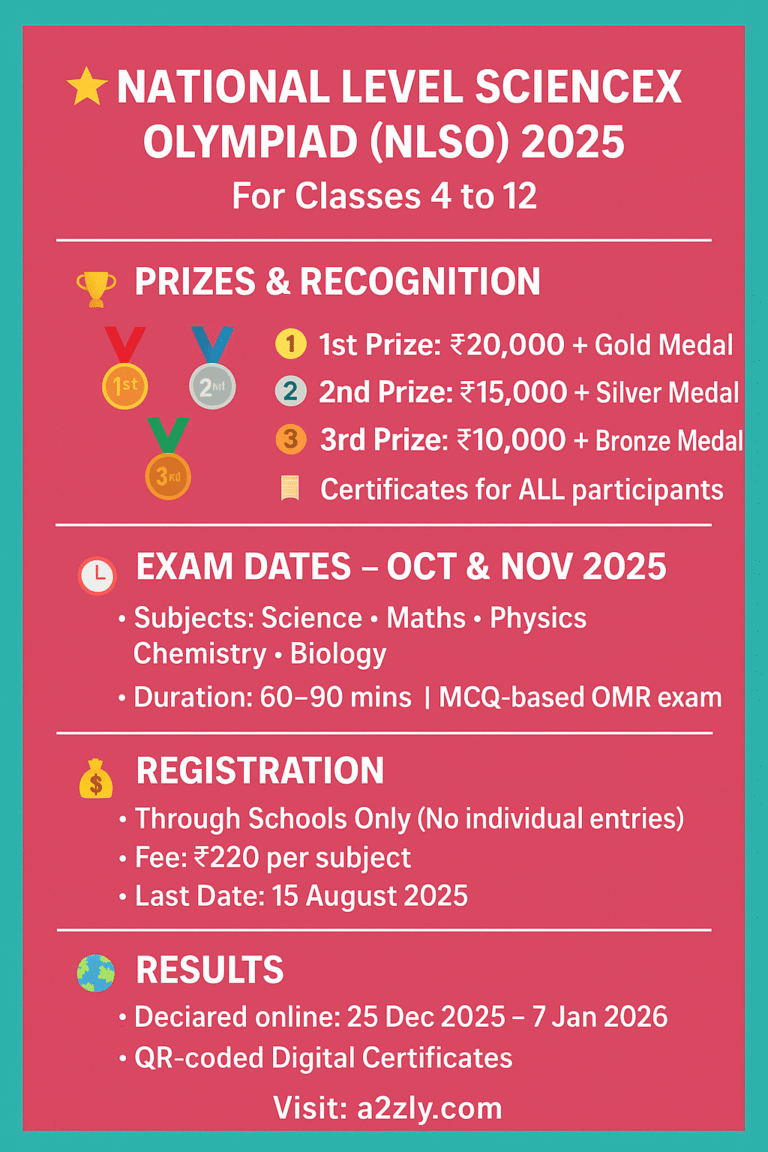The National Level ScienceX Olympiad (NLSO) 2025, organized by ScienceX Innovations, is a prestigious competition for Classes 4 to 12 across India and neighboring countries. It promotes curiosity, critical thinking, problem-solving, and scientific aptitude while offering recognition at the national level.
✨ Why Join?
Students boost logical reasoning, compete with peers across India, win cash prizes, medals, and certificates, and access mentorships and global opportunities.
📚 Eligibility & Exam Structure
Open to Classes 4–12, divided into four levels:
- Level 1: Classes 4–5 → 40 MCQs | 60 mins
- Level 2: Classes 6–8 → 50 MCQs | 90 mins
- Level 3: Classes 9–10 → 50 MCQs | 90 mins
- Level 4: Classes 11–12 → 50 MCQs | 90 mins
- Subjects: Science, Maths, Physics, Chemistry, Biology
- Dates: Oct & Nov 2025.
💰 Registration Deadline: 15 Aug 2025
- Fee: ₹220 per subject
🏆 Awards – Certificates for all participants.
- 🥇 ₹20,000 + Gold Medal
- 🥈 ₹15,000 + Silver Medal
- 🥉 ₹10,000 + Bronze Medal
🌍 Results Online: 25 Dec 2025 – 7 Jan 2026
🚀 In Short
The NLSO 2025 is more than just an Olympiad – it’s a gateway to growth, recognition, and innovation. With structured exams, strong academic support, digital-first results, and sustainability at its core, it’s the perfect platform for young minds to shine.
Table of Contents
Benefits of Participating in ScienceX Olympiads
- 🔥 Igniting Curiosity & Passion – Encourages students to explore science through challenging problems and experiments, sparking a lifelong interest in STEM.
- 🧠 Sharpening Critical Thinking – Develops analytical, logical, and creative problem-solving skills essential for academics and real life.
- 🤝 Building Collaboration & Teamwork – Promotes teamwork, communication, and leadership through group-based challenges.
- 💪 Boosting Confidence – Overcoming tough tasks builds self-belief, motivation, and the courage to aim higher.
- 🌍 Connecting Science with Real Life – Links concepts to real-world issues like climate change, healthcare, and sustainability.
- 📚 Enhancing Academic Excellence – Strengthens understanding of concepts, improving performance across STEM and other subjects.
- 🏆 Fostering Healthy Competition – Inspires students to push boundaries, strive for excellence, and keep improving.
- 🚀 Opening Doors to Future Opportunities – Provides access to scholarships, internships, and recognition from top universities and institutions.
Exam Schedule
The NLSO 2025, organized by ScienceX Innovations, is more than just a competition – it’s a platform for students to explore science, math, and technology while gaining national recognition.
| Examination | Levels | Date-1 | Date-2 | Time Slot |
|---|---|---|---|---|
| ScienceX Olympiad (SO) | Level 1, 2, 3 | Wed, 08 Oct 2025 | Thu, 19 Nov 2025 | 10:00 am – 11:30 am |
| ScienceX Math Olympiad (SMO) | Level 1, 2, 3, 4 | Thu, 09 Oct 2025 (Revised) | Wed, 20 Nov 2025 | 10:00 am – 11:30 am |
| ScienceX Physics Olympiad (SPO) | Level 4 | Tue, 13 Oct 2025 | Tue, 17 Nov 2025 | 09:00 am – 10:30 am |
| ScienceX Chemistry Olympiad (SCO) | Level 4 | Tue, 13 Oct 2025 | Tue, 17 Nov 2025 | 11:30 am – 01:00 pm |
| ScienceX Biology (SBO) | Level 4 | Mon, 14 Oct 2025 | Mon, 18 Nov 2025 | 11:30 am – 01:00 pm |
Eligibility
| Olympiad Name | Levels Available | Eligible Classes |
|---|---|---|
| ScienceX Olympiad (SO) | Level 1, 2, 3 | Classes 4 to 10 |
| ScienceX Math Olympiad (SMO) | Level 1, 2, 3, 4 | Classes 4 to 12 |
| ScienceX Physics Olympiad (SPO) | Level 4 | Classes 11 & 12 |
| ScienceX Chemistry Olympiad (SCO) | Level 4 | Classes 11 & 12 |
| ScienceX Biology Olympiad (SBO) | Level 4 | Classes 11 & 12 |
Question Paper Pattern:
Language of Question Paper: The question paper will be available in English.
- For Classes 4 & 5: 40 multiple-choice questions (MCQs)
- For Classes 6 to 12: 50 multiple-choice questions (MCQs)
- Each question will have one correct answer.
- Marking Scheme:
- Correct answer: +3 marks
- Incorrect answer: -1 mark (negative marking)
- Maximum Marks: 120 (for Classes 4 & 5) / 150 (for Classes 6 to 12)
Prizes & Certificates
- Participation:
All participants will receive certificates. - Student Awards:
- 1st Prize: ₹20,000 + Gold Medal
- 2nd Prize: ₹15,000 + Silver Medal
- 3rd Prize: ₹10,000 + Bronze Medal
- Top 1% of students (per center): Medals, Merit Certificates, and Distinction Certificates (based on scores)
- Top 10% of students (per center): Certificates
- Top 1% students (per state, per subject): Merit Certificates
- Top 1% students (national level in Physics, Astronomy, and Science): Special Merit Certificates + Surprise Prize
- Report Cards:
Generated for all candidates scoring above the Qualifying Threshold Score (QTS). These can be downloaded from sciencex.org.in by enrolled students. - School Awards:(Eligibility: Minimum 200 participating students)
- 1st Prize: ₹15,000 + Shield
- 2nd Prize: ₹10,000 + Shield
- 3rd Prize: ₹5,000 + Shield
- Teacher Awards:
- Top 10 teacher coordinators will receive ₹5,000 each*
- Certificates for coordinating teachers
- Opportunity to participate in capacity-building workshops on science themes
- Note:
- The listing of prizes and incentives is dynamic and may change depending on sponsorships and partnerships during the current academic session.
- A school will qualify for school-level prizes only if the number of participants exceeds 200.
Syllabus
Science Level 1 Syllabus (Classes 4-5) – DOWNLOAD
Maths Level 1 Syllabus (Classes 4-5) –DOWNLOAD
Science Level 2 Syllabus (Classes 6-8) – DOWNLOAD
Maths Level 2 Syllabus (Classes 6-8)- DOWNLOAD
Science Level 3 Syllabus (Classes 9–10)- DOWNLOAD
Maths Level 3 Syllabus (Classes 9–10)- DOWNLOAD
Biology – Level 4 Syllabus (Classes 11–12) – DOWNLOAD
Chemistry – Level 4 Syllabus (Classes 11–12) – DOWNLOAD
Physics – Level 4 Syllabus (Classes 11–12) – DOWNLOAD
Previous Year Papers with Answer Keys
| S.No. | Olympiads | Level 1 | Level 2 | Level 3 | Level 4 |
|---|---|---|---|---|---|
| 1 | ScienceX Olympiad (SO) | Click Here | Click Here | Click Here | – |
| 2 | ScienceX Maths Olympiad (SMO) | Click Here | Click Here | Click Here | – |
| 3 | ScienceX Chemistry Olympiad (SCO) | – | – | – | Click Here |
| 4 | ScienceX Physics Olympiad (SPO) | – | – | – | Click Here |
| 5 | ScienceX Biology Olympiad (SBO) | – | – | – | Click Here |
| 6 | ScienceX Astronomy Olympiad (SAO) | – | – | – | Click Here |
| 7 | ScienceX AI Olympiad (SAIO) | – | Click Here | Click Here | – |
Supplementary Resources
Supplementary Resources for Preparing for National ScienceX Olympiads (NLSO)
Success in the National ScienceX Olympiads (NLSO) requires strong conceptual understanding, logical reasoning, and consistent practice. To guide students in their preparation journey, the following books, online resources, practice materials, and study strategies are highly recommended.
📚 Recommended Books
For Classes 4–6
- ScienceX Olympiad Courses (CoursApp.in): Topic-wise workbooks with explanations and practice questions.
- NLSO Preparation Books: Designed for young learners, covering basics in a fun and interactive way.
- Brain Quest (Grades 4–6): Engaging quizzes that strengthen foundational scientific knowledge.
For Classes 7–9
- NCERT Science Textbooks: Essential for strong conceptual clarity.
- Olympiad Skill Development System (OSDS): Practice-oriented books with detailed solutions.
- Foundation Science (Physics, Chemistry, Biology): Comprehensive coverage for deeper learning.
For Classes 10–12
- Concepts of Physics (H.C. Verma): Highly recommended for physics mastery.
- Modern’s ABC of Chemistry (Class 11 & 12): Detailed explanations of chemical principles.
- Trueman’s Elementary Biology: Well-illustrated guide for biology Olympiad preparation.
📝 Practice Materials
- NLSO Past Papers: Best way to understand exam pattern and difficulty level.
- Official ScienceX Sample Papers: Preview of Olympiad-style questions.
- Workbooks & Mock Tests: Regular practice for self-assessment and time management.
🎯 Study Tips and Strategies
- Plan a Study Schedule: Divide time systematically among subjects.
- Know the Syllabus: Focus only on topics relevant to the Olympiad.
- Practice Consistently: Build speed and accuracy through daily practice.
- Group Learning: Discussing with peers helps broaden understanding.
- Seek Guidance: Approach teachers or mentors for challenging topics.
👉 With the right mix of books, digital tools, practice papers, and smart strategies, students can confidently prepare and excel in the National ScienceX Olympiads (NLSO).
Problem-Solving Strategies
Problem-Solving Strategies for ScienceX Olympiads
Success in ScienceX Olympiads depends on subject-specific approaches combined with strong reasoning, analytical skills, and practice. Below are effective problem-solving strategies tailored for each subject area:
🔬 Science
- Identify the Problem: Clearly define what needs to be solved or investigated.
- Gather Information: Collect relevant facts, theories, and background knowledge.
- Formulate a Hypothesis: Develop a logical explanation or prediction.
- Design and Conduct Experiments: Test the hypothesis systematically.
- Analyze Data: Apply statistical and analytical methods to interpret results.
- Draw Conclusions: Decide whether the hypothesis is supported or refuted.
- Communicate Findings: Present results through reports, discussions, or presentations.
➗ Mathematics
- Understand the Problem: Carefully read and identify key details.
- Devise a Plan: Select the right approach (algebra, geometry, number theory, etc.).
- Execute the Plan: Solve step by step, showing all calculations.
- Check the Solution: Verify accuracy and logical consistency.
- Reflect & Generalize: Explore how the method can apply to similar problems.
- Practice Consistently: Regular exposure to varied problems builds speed and accuracy.
⚡ Physics
- Break Down the Problem: Identify principles (laws, forces, motion, energy, etc.).
- Draw Diagrams/Graphs: Visualize the situation clearly.
- Apply Equations: Use appropriate physical formulas.
- Solve Step by Step: Work systematically through calculations.
- Check Units & Accuracy: Ensure unit consistency and realistic results.
- Interpret Results: Connect solutions back to real-world physical meaning.
- Practice Widely: Exposure to diverse problems strengthens application skills.
⚗️ Chemistry
- Identify Known & Unknowns: Clarify what is given and what needs solving.
- Apply Principles: Use relevant theories (atomic structure, bonding, reactions).
- Balance Equations: Ensure mass and charge conservation.
- Perform Calculations: Use stoichiometry, molarity, and gas laws effectively.
- Check Limiting Reagents: Consider constraints in reactions.
- Validate Answers: Use unit analysis and estimation.
- Review Concepts: Connect solutions to broader chemical understanding.
🧬 Biology
- Understand the Question: Pinpoint the process or concept being tested.
- Organize Information: Sort experimental data, diagrams, or pathways.
- Apply Biological Concepts: Use principles like genetics, physiology, ecology, etc.
- Analyze Data: Apply statistics and graphical interpretation.
- Consider Variables: Account for factors influencing biological outcomes.
- Evaluate Evidence: Judge reliability and validity of data.
- Communicate Clearly: Use precise biological terminology.
🌌 Astronomy
- Define the Problem: State the astronomical question clearly.
- Collect Data: Use observational or theoretical sources.
- Apply Models & Theories: Use established astronomical frameworks.
- Use Computational Tools: Employ software for simulations or calculations.
- Account for Observational Limits: Recognize constraints like equipment sensitivity.
- Collaborate with Experts: Seek peer validation and alternative perspectives.
- Document & Share: Record methods and publish findings.
✨ Common Principles Across All Subjects
- Critical Thinking: Question assumptions and test ideas.
- Logical Reasoning: Move step by step from problem to solution.
- Consistency & Practice: Build skills through regular problem-solving.
- Effective Communication: Present solutions clearly and concisely.

